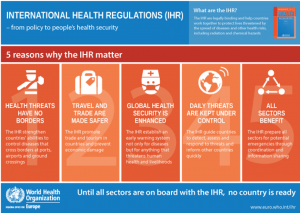Ensuring that Global Health Security programmes are as effective as possible by conducting thorough utilisation-focused evaluations is potentially a vital component of ongoing efforts to ensure that future outbreaks are controlled as quickly as possible.
At this very moment, we find ourselves surrounded by reports of the rapid spread of another deadly respiratory illness, which has already spread beyond China’s borders and across the Atlantic.
Whilst the WHO (World Health Organisation) has decided not to declare a Public Health Emergency of International Concern 1 for now, again a spotlight has been shone on the regulations, institutions and organisations working within the dynamic and rapidly growing sphere of Global Health Security.
Independent evaluation of innovative interventions plays an important role in this space, to ensure questions around effectiveness and coherence with other global efforts, value for money and sustainability are answered and inform timely course correction.
The IHR regulatory framework and beyond
As their name suggests, one of the main purposes of the IHR (International Health Regulations) is to provide a framework within which nations are obligated to implement key public health measures to help reduce the spread of diseases beyond national borders, including imposing travel restrictions and complying with international reporting mechanisms.
What is perhaps not so widely known is that the IHR also set out core capacity requirements at country level for effective surveillance and response. Thus, as part of becoming signatories to the IHR, countries have agreed to build their capacities to detect, assess, report and respond to public health events. While the WHO has the overall coordinating role in the IHR, it also works alongside many other partners in supporting countries to build their IHR capacities.

Effective Monitoring and Adaptive Management: the case of Public Health England
The UK government is an important partner in this area, and the DHSE (Department of Health and Social Care) has a growing portfolio of work in Global Health Security. One key programme in their portfolio is PHE’s (Public Health England) IHR Strengthening Project.
The IHR Strengthening Project is funded through the UK Aid budget to work in partnership with WHO at a global and regional level to strengthen their IHR compliance and effectively prepare for and respond to public health emergencies.
Supporting PHE in adaptive management is a key part of Itad’s role as the PHE IHR Strengthening Project’s Third Party Monitoring and Evaluation partner. Our evaluation is aimed at answering some key questions for implementers, around the project’s sustainability, its effectiveness, alignment and coherence and value for money, which is all dependent on its work with partners at national and regional level.
Trusted partnerships
One of the challenges of working with governments in the area of outbreaks are sensitivities around reporting of new outbreaks due to potential impact on trade, travel and the wider economy 2 . The PHE IHR Strengthening Project’s focus on the building of effective partnerships with national and regional governments supports the provision of more targeted and effective technical assistance, which can help to overcome these kinds of sensitivities and help to ensure that countries have not just the necessary IHR technical capacities, but also the required network and partnership support. However, measuring the outcome and impact of this kind of support is challenging, especially in countries with multiple partners working in GHS.
A Focus on Learning
In the coming months we will be building on the current mid-point evaluation process by producing key learning briefs to support PHE in looking at how they can more effectively monitor their work in IHR Strengthening, in order to inform adaptive programme management and wider learning. A key part of this work will also be looking at how the IHR Strengthening Project is contributing to DHSC’s overall GHS Programme intended outcomes and impact in accordance with their overall Theory of Change 3 . Moving forward, we hope that our work with PHE and DHSC will add to the global body of evidence around global health security, and help to reduce the impact of future outbreaks.
Images:
Infographic – IHR: from policy to people’s health security © Credit: WHO

